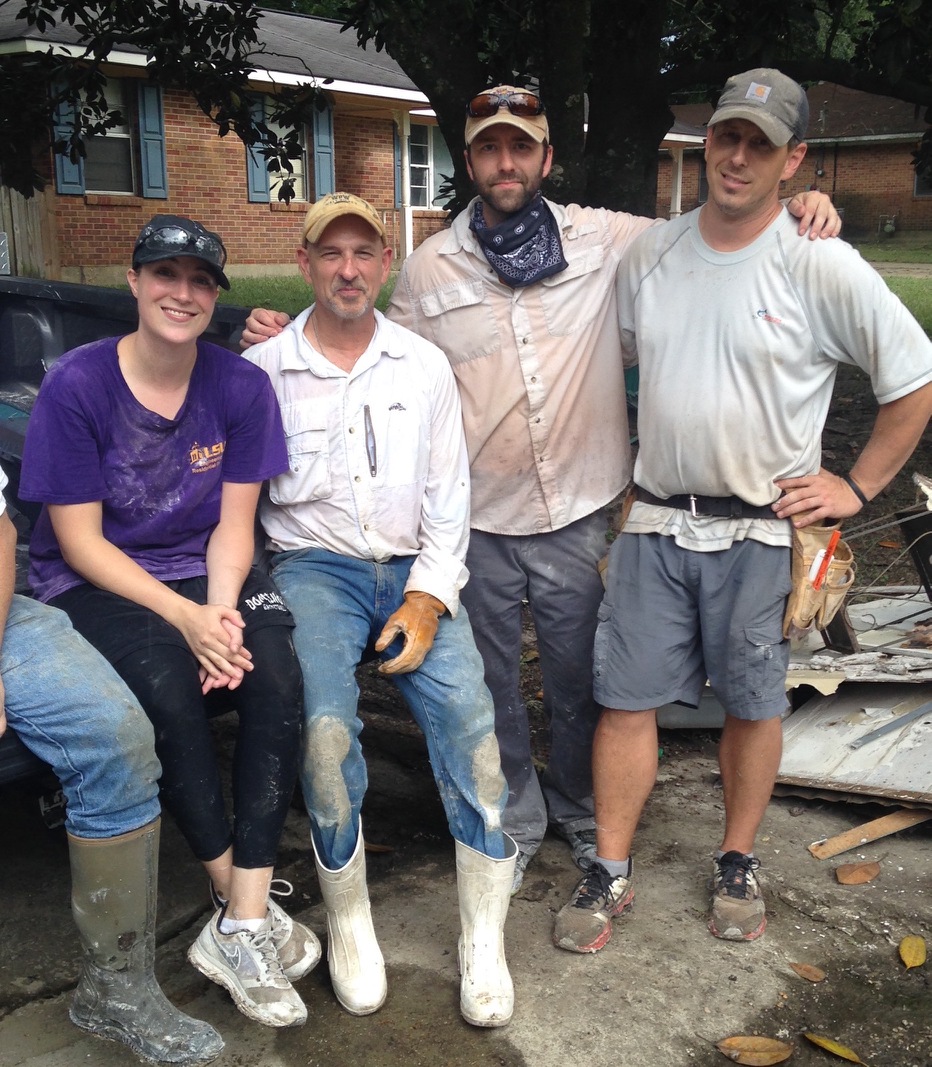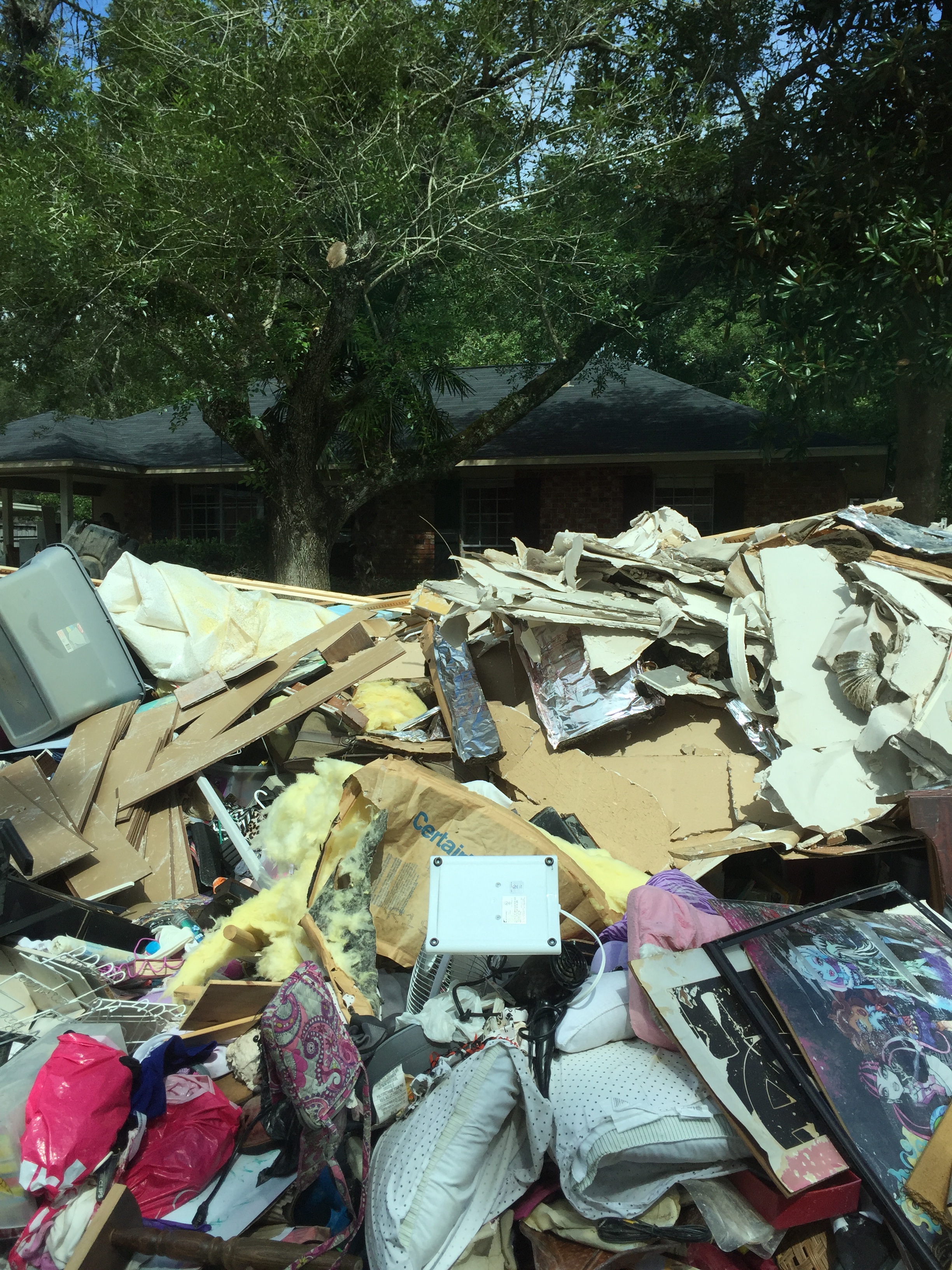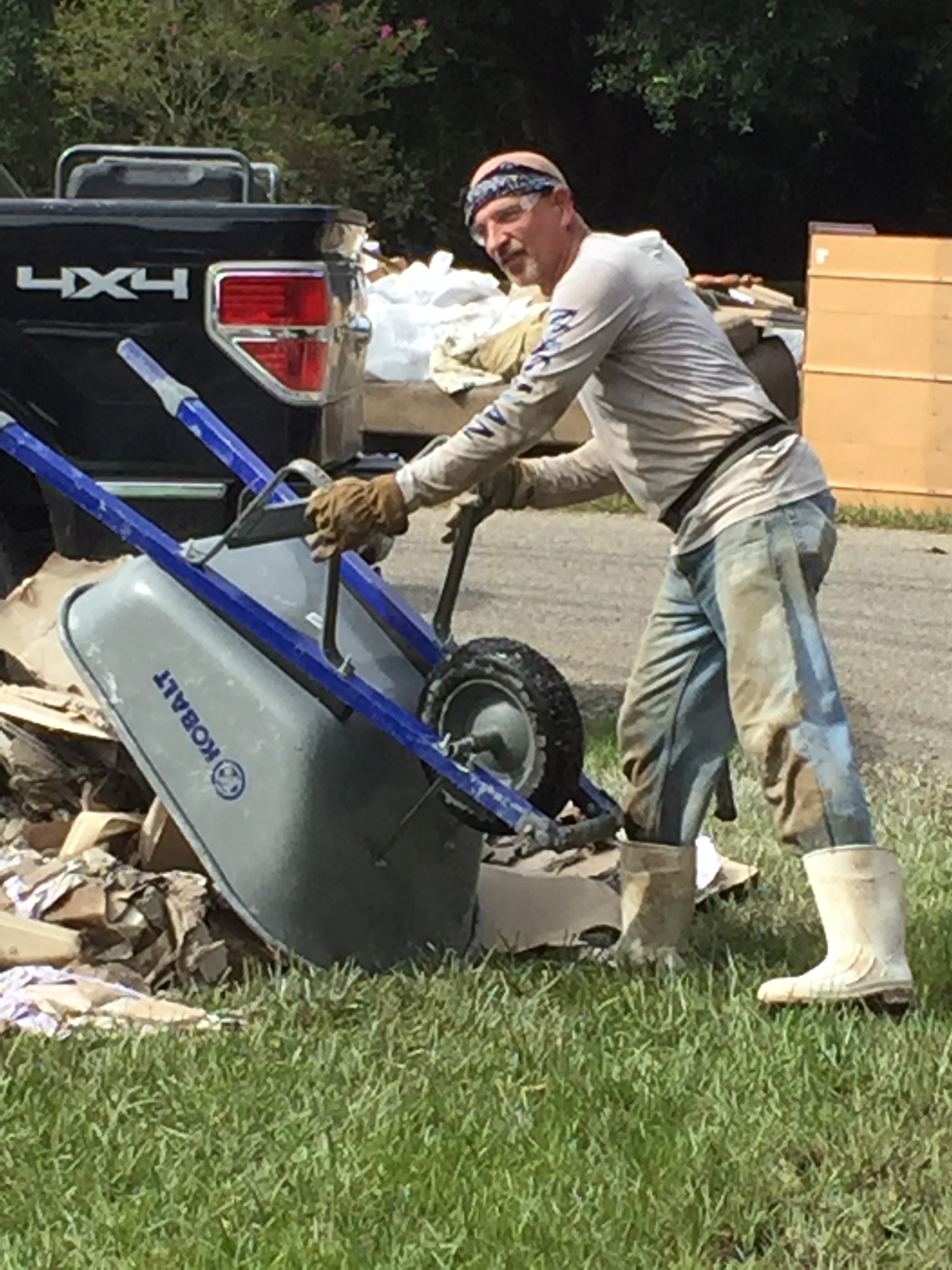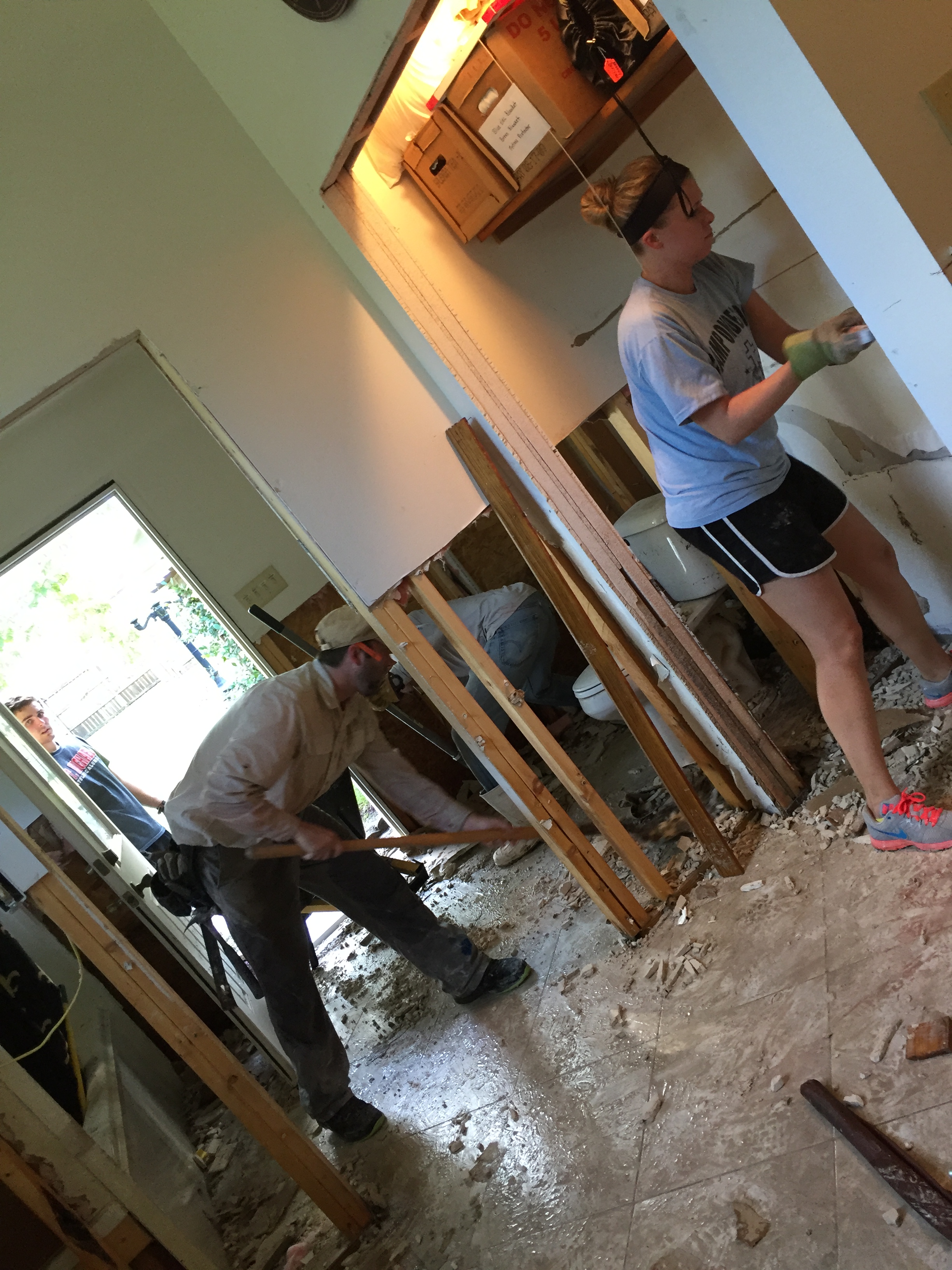AFTER THE FLOOD:
ST. MICHAEL’S ARMY
—
AUTHOR’S NOTE // This article was originally written + published in the aftermath of the 2016 flooding in Baton Rouge, Louisiana. Other than this author’s note, the article has not be edited or changed in any way.
Despite the fact that both of the records he’s released in the last two years have hand-drawn sailboats on the cover, Chris Cole is not a sailor in the Cajun Navy. He’s part of a much younger organization, born out of necessity this past week: he is a soldier in St. Michael’s Army.
While he travels as often as his schedule allows — as a songwriter, performer, musician, and recording artist — sharing his songs and stories with audiences all over the country, Chris has a love and a gift for teaching. This August he started his fourth year at St. Michael the Archangel, a Catholic high school in Baton Rouge, Louisiana. Barely a week into this academic year, however, school was, to put it mildly, interrupted.
“It’s all kind of blurring for me now,” he begins our conversation. “It’s a mess, man.”
Between Thursday and Sunday (August 11-14), Baton Rouge was hit with about 21 inches of rain, and some of the surrounding areas were hit even harder. Tens of thousands of people have been rescued. Tens of thousands of homes have been destroyed. The death toll as of Friday (August 19) remains surprisingly low at 13, though that number may well rise as more homes are searched.
Other than the possibility that school might be cancelled due to a few roads flooding over, nothing about this rain seemed too far out of the ordinary for August in Baton Rouge. “Nobody was talking about the rain being abnormal, as of Thursday,” Chris says. “On Thursday people were like we’re waiting to see if what’s-his-name is gonna swim and win a bunch of gold medals.” By Friday, he tells me, no one cared about the Olympics.
Chris lives in a second-floor apartment. His home and area weren’t damaged. But the best word he can think of to describe what just happened in Baton Rouge, where he’s lived his entire life, is: devastating.
He sent me a text on Friday afternoon. I didn’t hear from him again until Sunday night. “It’s pretty crazy,” his text read. “I just got phone service again…It’s nuts how fast it all happened. I’ve never experienced this.”
Once they got a bit of relief from the weather, a handful of other teachers from St. Michael’s reached out to Chris for help. “Me and these guys, we’ve got tools so we’ve just been going and gutting people’s houses.” This is St. Michael’s Army.

from left to right: Jeanne Kinney (girls basketball coach), Kevin “Doc” Andry (band director), Chris Cole (history & Russian language teacher), Rob Smith (athletic director, history teacher)
Out of sheer necessity, they’ve become a crew, perhaps the most daunting kind of crew: a wrecking crew. They enter homes that have been destroyed and begin the process of cleaning and rebuilding them…by destroying them more. “We rip your house to shreds to save it,” he tells me. That’s the only way. Water, on objects where mold can grow, is like cancer. They’ve got to cut the cancer out as quickly as possible, if they hope to save the house.
Houses in Baton Rouge flooded with anywhere from three to 12 feet of water. “The houses I was in had five, six feet of water,” Chris says. The flooding process, as he describes it, is like this: Water fills the house. Eventually the refrigerator is lifted, opens, and all the food is exposed. All the animals — snakes, rats, etc. — that may have sought shelter in the house or simply may have been swept into it via the rising waters are now dead, wet, and rotting, along with all the food. The drywall has been soaking wet in Louisiana’s heat and humidity for days and mold is starting to grow. When Chris’ crew steps into a home to start gutting it, this is what they’re stepping into. “There’s a creepy feeling to a lot of these houses,” he says. “There’ve been a few times where the smell is so bad it just makes you want to vomit.”
Tons of people have already started the process of starting over. “People will be gutting and cleaning houses for the next month,” Chris surmises, “at least the next month.” But everything that’s ruined, everything that’s trashed, everything that needs to be ripped out, where is it all going to go? People have essentially been piling it all up outside, in between the sidewalk and the street, like walls of garbage “that just smells and it’s rotting.” This is what driving down the street is like:
Chaos and destruction can bring out the worst in people. There’s been a lot of theft — carjacking, boatjacking, people stealing valuables, stealing food, pulling guns, etc. Chris says, “It feels like Walking Dead stuff.” And yet, the best in people is being brought out, too. “Restaurants that are open, they’ve just been setting up in the parking lots and giving people food…Everybody kind of turned inward in the right way, to help each other.”
Despite the fact that people’s homes and places of work — along with most vehicles, clothes, and access to food — have been destroyed, the strength of community seems to be prevailing. “People have been volunteering and cooking and just driving through neighborhoods to find hungry and thirsty people who may not have eaten any other way.” He wrote that to me in a text message after our conversation. It was a positive he really wanted emphasized.
“My life feels very day-to-day in a way that I don’t think it ever has before,” Chris says. “You’re just constantly reacting to what’s going on.” That’s what his crew from St. Michael’s is doing — reacting to what’s going on. But there’s so much to be done. It’s exhausting. I can hear it in his voice when he tells me: “The crew I’m working with, we kind of feel like we’re wearing down.”
For almost a week now they’ve been moving from house to house, gutting and cleaning as best they can. “The school, since it’s dry, has been helping coordinate,” he says. Folks at St. Michael’s are reaching out to the families of their students to make sure that everyone is okay, that everyone has food, a place to stay, the help they need. “I get a list of people texted to me every day, like, all these people need help,” Chris tells me. “The scope and scale is too much…That’s been the most overwhelming thing…” He’s referring to the struggle that he and his crew now have to face every day: deciding who to help. That’s “the most overwhelming thing.” If they choose to help this person, they’re choosing not to help that person. And they can’t help everyone. There are too many in need. “How do you decide who to save? Who to help? It’s a frustrating guilt and dilemma that weighs heavy on all of our crew…”
The way Chris talks about his crew is inspiring. He had respect for them before the flood, as friends and colleagues. But that respect is more profound now, more rooted in gratitude and admiration. There’s a comradery between them, like they’re on an adventure. It’s not an adventure any of them ever wanted to go on, but at least they’re on it together. “These people are so amazing,” Chris says, adding emphatically, “we’re a family.”
Chris’ apartment, car, and possessions weren’t damaged at all by the flooding, but so many people close to him [and who live just a few miles from him] have lost everything. Needless to say, his perspective is unique. Some of his family members’ homes were destroyed. Some of his students’ families’ homes were destroyed. And rebuilding isn’t always possible. In far too many cases, whether a lost home will be rebuilt or replaced depends entirely on whether the homeowner had flood insurance. If so, rebuilding may well happen. If not, for too many, foreclosure may be the only way to try to start again. “I kind of never want to buy another object,” Chris muses, as though he’s thinking out loud over the phone. “Baton Rouge and the surrounding areas may become very Buddhist in their attachment to objects.”
Emotions have run the gamut. Everyone seems to be processing the events differently. Some have very healthy, detached attitudes about it all. They seem hopeful, optimistic, and grateful to be alive. For others, that level of detachment hasn’t come so easily. “The guys that I’ve been around, they’re handling it worse than the women,” Chris tells me. “They feel helpless, like they couldn’t save their homes for their families.”
He’s been able to observe a lot of folks sifting through the wreckage of the lives they knew a week ago. But it doesn’t seem to be the loss of possessions or things, even expensive things, that hurts the most. Rather, it’s the loss of photographs, family heirlooms, objects that meant something, that represented people who may have died long ago. To no longer have these objects, this seems to trigger the most tears. Losing the last thing you have to remember someone by feels like you’re losing the person all over again. With the tangible reminder either lost or badly destroyed, will the memory remain? Or will it, too, like the flood waters, eventually recede, leaving behind a murkier, faded version of what was? Witnessing moments where such loss is realized, I can tell, was profound for Chris.
As of today, classes are set to resume at St. Michael’s on Monday (August 22). As a teacher, that’s an administrative decision that Chris has to accept, though it wasn’t one he had a hand in making. He wonders, “What are our expectations as educators at this point?” Subsequent questions follow: Do we get on kids for not doing their homework? Do they even have a computer at home still? Do they have clean clothes? Do they still have their school uniforms? Do they have food? Do their parents still have cars? Are they even going to be able to get to school? There are still so many uncertainties. “The normal resources you have don’t exist,” he says. “A lot of the rules that make up school make no sense in this context anymore.”
It was interesting, to say the least, for me to hear Chris’ perspective. One of the first things he said to me on the phone was, “I feel like my brain is a mush right now. I’m really tired…I don’t think I’ve had much time to reflect on what’s happened.” He’s been working non-stop, day in and day out, for a solid week. I asked a handful of questions over the course of our conversation, but for the most part it felt like a one-sided stream of consciousness.
Some text messages he’s received from friends who live in other parts of the country have made him realize just how many people still have no idea what’s happened in Louisiana, or, at least, that so many people don’t fully grasp the gravity of the situation or the depth of the destruction. While he wishes folks were a little more aware, he doesn’t feel like he can really blame them. He was more interested in other things a week ago, too, after all.
He’s not angry at anyone. And he isn’t looking for someone to blame. He simply wants to do the work that needs to be done. He isn’t interested in politicians flying down to Louisiana for photo opportunities. If they’re going to grab some tools and help gut some houses, all are welcome. Otherwise, politicizing the situation doesn’t help anybody.
Then there’s that inevitable question that people from the outside are already asking all over social media: why bother rebuilding if it may just happen again? Chris admits that it’s a hard question to answer. He describes to me this sense that the environment is connected to the culture so much so that what they’ve got, their whole way of living life, couldn’t ever be duplicated anywhere else. So that question, ultimately, isn’t much different than: why don’t you leave your home and all you’ve ever known and just start over somewhere else? Sometimes people do that. But it’s never easy. Perhaps the question shouldn’t be asked so assumingly.
Two videos, in particular, seemed to go viral on my Facebook feed this week: (1) the dramatic rescue of the woman and her dog from a car submerged in water and (2) a kid showing off his dance moves on the local news. Chris’ inflection becomes more relaxed and jovial when talking about the latter. “It was such a perfect moment for everyone down here,” he says. “I kind of want to vote for him for president. He should be president.”
In terms of what’s next for Chris, I suppose that will be returning to St. Michael’s on Monday to resume classes. He’s teaching Art History, World History, and Russian Language & Culture this year. While getting back into the swing of school seems so strange to him after everything that’s happened, he acknowledges the benefits of returning to some semblance of normalcy. He’s also considering giving up his apartment to a family who needs it more, in which case he would “just find some other place to stay.” As I said, he’s just trying to do what needs to be done as best he can. “We’re doing life. This is what it is,” he says. “And I don’t want to trade it.”
UPDATE (8/24/16) — Classes did resume at St. Michael’s on Monday, August 22nd. While some students and their families are still “living in shelters and without anything,” Chris told me that, overall, “it was a good thing for them to get out of those places and have some fun with their friends.”
MAKE A DONATION // If you’d like to make a donation to help the victims of the 2016 flooding in the St. Michael High School community, you may do so here.
SUPPORT CHRIS // If you’d like to support Chris as an artist, please consider purchasing his music on iTunes, Amazon, or Bandcamp (music streaming services pay artists very little money).


